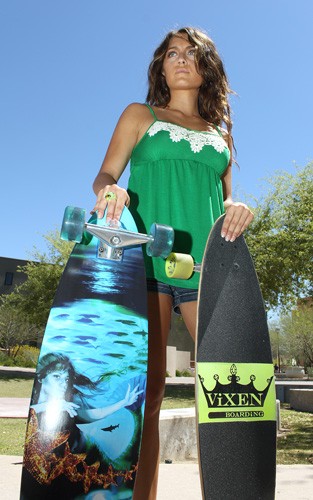After noticing an absence of longboards made specifically for women and being a passionate rider herself, Brienne Duvauchelle, a psychology junior, ventured into business with her friend Gregg Foster and created Vixen Boarding.
“”I find that the culture of longboarding has really flourished in the last couple of years, especially around college campuses,”” Duvauchelle said. “”I’m hoping to pinpoint the demographic of female college students.””
The difference between a Vixen board and a regular longboard is the weight and structure. The wood is nine-ply as opposed to 11-ply, so the board is lighter and the its trucks have a unique structure, made out of only three pieces instead of 11.
“”It makes it easier to turn without using as much weight,”” Duvauchelle said. “”Most men have a little more weight they can put into it, but this takes very little effort to accomplish tight-radius turns.””
Duvauchelle’s boards are being sold in a few Tucson retail shops, including a UA Bookstore on Park Avenue, and at a few shops in Los Angeles. Those interested can also visit her Web site, vixenboarding.com, to buy a board.
Foster and Duvauchelle met through a mutual friend. He approached her about the idea after seeing her board. Foster asked her if there were longboards designed for girls and after some research, they came up with the idea for the company.
“”I don’t really have a good business sense but fortunately … he’s very business savvy and I called upon his help in order to branch out to the market that I’d like to,”” Duvauchelle said.
The idea took about two years and took off last summer when Duvauchelle ordered the inventory and began putting the boards together.
“”I think that’s what makes us so different,”” Foster said. “”The co-owner of our company actually rides them, tests them out. It’s not like a bunch of guys putting them out for women.””
Duvauchelle, an art minor, said she enjoys designing the boards and getting into the artistic aspect.
“”I focus more on the design aspects and I’m hoping to develop more of an apparel line which I hope will be a little more successful than our sales of boards,”” she said.
According to Foster, the two want to eventually expand the company to include wakeboards, surfboards, snowboards, apparel and jewelry.
“”Right now we’re in talks with several skateboard companies over on the West Coast about putting them in their retail shops. We may at some point open up our own shop, that I don’t know,”” Foster said. “”We’re having too much fun having them in different stores … right now it’s just fun.””
Patricia Taylor, a former Raytheon executive, has mentored Duvauchelle through her business process.
“”In a way, by her providing these longboards … she’s also mentoring others,”” Taylor said. “”She’s doing something that she loves, that she has a passion for, and she brings that passion and joy to the work and our meetings, and frankly it’s a great joy to be involved in this company.””
Taylor said she enjoys coaching Duvauchelle through her artistic and business processes, while helping her improve her manufacturing and operations to maximize her profits.
“”She will be able to broaden this and branch out to other lines associated with boarding,”” Taylor said. “”And have the ability to look at this company and see what the future of personal transportation might be and look at longboarding as a possibility of alternatives and not necessarily think of it as … doing tricks and that sort of thing, this is more than that.””
Duvauchelle said she wants to encourage women not to be intimidated by boarding sports.
“”It’s more of a lifestyle that we’re really trying to create right now,”” Duvauchelle said. “”We just want to eliminate that intimidation factor and see more people empowered.””









